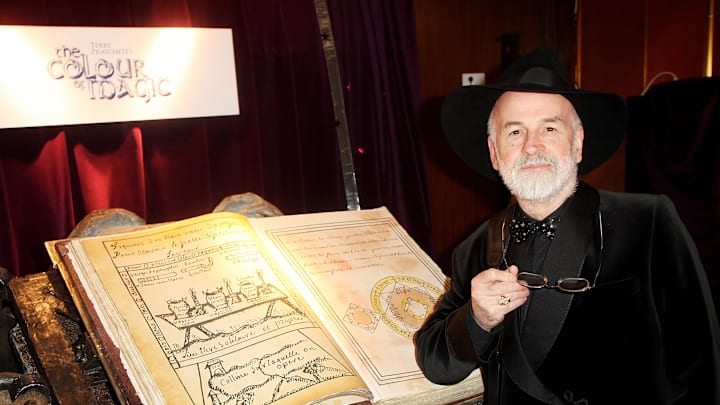Sir Terry Pratchett (1948-2015) is known for books full of his biting satire, his creative genius, and his varied characters. You may already know him as the co-author of Good Omens or the man who brought us the book behind The Amazing Maurice and His Educated Rodents. While his first Discworld book introduced us to a wizard more inept than Mr. Filch, my favorite of his magical novels is about witches. Here's why I recommend Witches Abroad for a truly magical experience.
"Because stories are important."
From the beginning, Pratchett challenges us to think of lore in a different way. "People think that stories are shaped by people. In fact, it's the other way around," he says. He builds a foundation on the idea that "Stories exist independently of their players." This isn't a commentary on Joseph Campbell's The Hero With a Thousand Faces, but a rule to remember as you proceed through the book. Or, as he puts it later "This is a story about stories. Or what it realy means to be a fairy godmother."
We are introduced to a coven of witches where "everyone brought potato salad" to the sabbat. They have a legacy to uphold as Desiderata, the local fairy godmother, is dying. She is determined to pass on her powers, not to the person who will make all people's dreams come true, but to the newcomer who has no practical experience in how fantasy works. Pity for Magrat Garlick, who inherits the wand and the title. Not because she's no good at magic - though she does turn everything into pumpkins for a while - but because she is set upon by Nanny Ogg and Granny Weatherwax, who have their own ideas on how to make the world go round.
There is a wolf who wants to stop preying on unsuspecting children. Toymakers who don't want a life of quiet industry. Most importantly, "Ella Saturday muste NOTTE marry the prins." But there is an antagonist named Lilith who likes nothing more than a happy ending and she will burn the world down to make sure it happens.
I won't spoil the rest of the story, but this being Terry Pratchett, the story ends in an emotionally convoluted place for everything and it makes you think seriously about why you appreciate the fairy tales you hold dear.
And if that doesn't frighten you off, we can discuss what happens when these opinionated witches wax Shakespearean in Wyrd Sisters.
